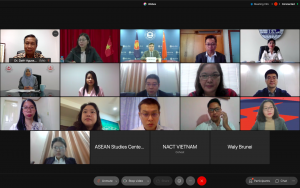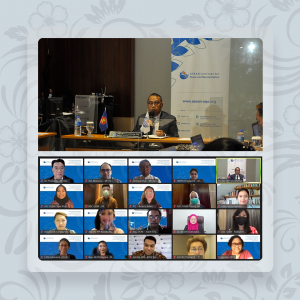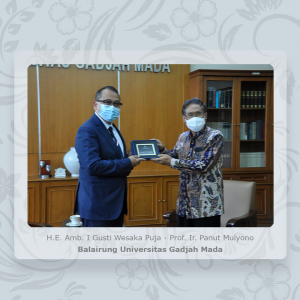Public Lecture on ASEAN Women and Children Protection through Civil Society and Academic Participation
The ASEAN Studies Center of Universitas Gadjah Mada, with the sipport of the Netherlands Embassy in Jakarta has conducted a series of discussions regarding the ASEAN Commission on the Protection of the Rights of Women and Children (ACWC) to map possible engagement efforts with the aim of strengthening the promotion and protection of women and children in the region. The series of discussions have commenced since October 2020 following the commemoration of the 10th anniversary of the ACWC.
On Monday, 30 August 2021 a Public Lecture titled “ASEAN Women and Children Protection through Civil Society and Academic Participation” was held to further map potential roles that CSOs and think tanks can play to further advocate for the of women and children. The Lecture was officially opened by the opening remarks from Dr. Dafri Agussalim as the Executive Director of ASEAN Studies Center UGM, and H.E. Amb. Lambert Grijns as the Ambassador of the Kingdom of The Netherlands to Indonesia, Timor-Leste, and ASEAN.
This Public Lecture was attended by approximately 60 participants from across ASEAN members. Moderated by Ms. Yuyum Fhahni Paryani, former Indonesian Representative for the ACWC on Children’s Rights, the discussion invited four panelists namely Dato Paduka Dr Haji Junaidi bin Haji Abd. Rahman as the ACWC Chair and Brunei Darussalam’s Representative for Children’s Rights, Ms. Yanti Kusumawardhani, Indonesia’s Representative to the ACWC for Children’s Rights, Ms. Santi Kusumaningrum, Director of PUSKAPA – Center on Child Protection and Wellbeing at the University of Indonesia, and Ms. Rachel Tan, as Program Officer and focal point for the Women Gender and Diversity Working Group of the Asia Pacific Refugee Rights Network (APRRN).
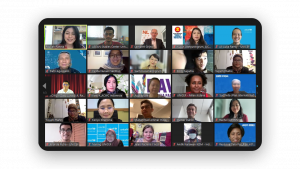 The discussion highlighted a number of issues including the role of CSOs and the academic community which is to support the State in undertaking the obligation as duty bearer in fulfilling the rights of Children, to contribute to CRC Alternative Report CRC in order to support the government efforts on implementing CRC including ensuring child participation, to undertake research on the situation and well-being of women and children, and contribute on implementing Concluding Observation of CRC beneficial as foundation works on measures to child rights realizations.
The discussion highlighted a number of issues including the role of CSOs and the academic community which is to support the State in undertaking the obligation as duty bearer in fulfilling the rights of Children, to contribute to CRC Alternative Report CRC in order to support the government efforts on implementing CRC including ensuring child participation, to undertake research on the situation and well-being of women and children, and contribute on implementing Concluding Observation of CRC beneficial as foundation works on measures to child rights realizations.
The academic community can also come together by directing the government towards three main areas of support for women and children: social protection, family support and specialized protection. These points are to be included in policy briefs/suggestions to inform policy makers of an added layer of vulnerability and risk experienced by children due to miscalculated policies.
The importance of participatory approaches was also highlighted during the discussion, especially on issues concerning refugee women and children. The ACWC can play a strategic role in engaging and consolidating the many different fronts and actors to prevent miscalculated policies from being found.
The discussion also invited discussants, namely H.E. Yuyun Wahyuningrum, the Representative of Indonesia to AICHR, Mr. Ali Aulia Ramly, Child Protection Specialist of UNICEF Indonesia, and Ms. Audrey Lee, Senior Program Manager at International Women’s Right Action Watch Asia-Pacific (IWRAW-AP).
The discussion was closed by Ms. Yuyum Fhani Paryani as the moderator with a summary of the discussion which was carried out.

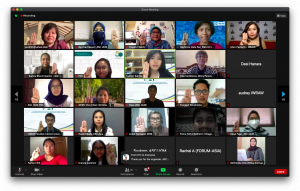

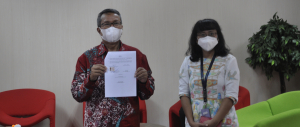
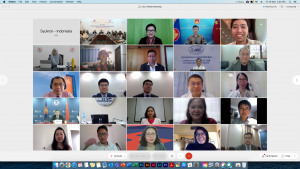 On a similar note, Dr. Nguyen Hung Son, the Vice President of Diplomatic Academy of Viet Nam (DAV), acknowledged that the forum could be a platform to discuss and comprehend each view on the Southeast Asia region’s development. On this occasion, the panel is expected to promote good relationships and bring prosperity to the parties. As an essential dialogue partner, a substantive partnership among NACT members is needed in order to construct ideal regional architecture. In regards to current challenges, the foundation of the cooperation must be based on responsibility and responsiveness.
On a similar note, Dr. Nguyen Hung Son, the Vice President of Diplomatic Academy of Viet Nam (DAV), acknowledged that the forum could be a platform to discuss and comprehend each view on the Southeast Asia region’s development. On this occasion, the panel is expected to promote good relationships and bring prosperity to the parties. As an essential dialogue partner, a substantive partnership among NACT members is needed in order to construct ideal regional architecture. In regards to current challenges, the foundation of the cooperation must be based on responsibility and responsiveness.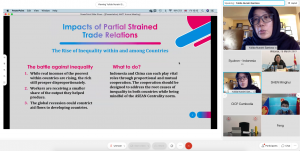 The meeting was concluded with a hope to enhance mutual trust and understanding between China and ASEAN member states, as well as exchanging knowledge and perspective to ensure stability, resilience, and development in the region.
The meeting was concluded with a hope to enhance mutual trust and understanding between China and ASEAN member states, as well as exchanging knowledge and perspective to ensure stability, resilience, and development in the region.

